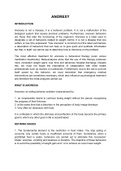http://cps.sagepub.com/
Why Small States Offer Important Answers to Large Questions
Wouter P. Veenendaal and Jack Corbett
Comparative Political Studies published online 6 November 2014
DOI: 10.1177/0010414014554687
The online version of this article can be found at:
http://cps.sagepub.com/content/early/2014/11/06/0010414014554687
Published by:
http://www.sagepublications.com
Additional services and information for Comparative Political Studies can be found at:
Open Access: Immediate free access via SAGE Choice
Email Alerts: http://cps.sagepub.com/cgi/alerts
Subscriptions: http://cps.sagepub.com/subscriptions
Reprints: http://www.sagepub.com/journalsReprints.nav
Permissions: http://www.sagepub.com/journalsPermissions.nav
>> OnlineFirst Version of Record - Nov 6, 2014
What is This?
Downloaded from cps.sagepub.com by guest on November 7, 2014
,554687
research-article2014
CPSXXX10.1177/0010414014554687Comparative Political StudiesVeenendaal and Corbett
Article
Comparative Political Studies
1–23
Why Small States Offer © The Author(s) 2014
Reprints and permissions:
Important Answers to sagepub.com/journalsPermissions.nav
DOI: 10.1177/0010414014554687
Large Questions cps.sagepub.com
Wouter P. Veenendaal1 and Jack Corbett2
Abstract
Small states are conspicuously absent from mainstream comparative political
science. There are a variety of reasons that underpin their marginal position
in the established cannon, including their tiny populations, the fact that
they are not considered “real” states, their supposedly insignificant role
in international politics, and the absence of data. In this article, we argue
that the discipline is much poorer for not seriously utilizing small states as
case studies for larger questions. To illustrate this, we consider what the
case study literature on politics in small states can offer to debates about
democratization and decentralization, and we highlight that the inclusion of
small states in various ways augments or challenges the existing literature
in these fields. On this basis, we argue that far from being marginal or
insignificant, the intellectual payoffs to the discipline of studying small states
are potentially enormous, mainly because they have been overlooked for
so long.
Keywords
democratization and regime change, decentralization, quality of democracy,
small states, comparative politics
1Royal Netherlands Institute of Southeast Asian and Caribbean Studies, Leiden, The
Netherlands
2Griffith University, Brisbane, Australia, and the Australian National University, Canberra,
Australia
Corresponding Author:
Wouter P. Veenendaal, Royal Netherlands Institute of Southeast Asian and Caribbean Studies,
Reuvensplaats 2, Leiden, 2311 BE, The Netherlands.
Email:
Downloaded from cps.sagepub.com by guest on November 7, 2014
, 2 Comparative Political Studies
Introduction
In comparative political research, the smallest countries in the world are
largely excluded. Although there are significant differences in the threshold
that scholars apply to exclude small states, almost all publications in this field
do employ a cutoff point that results in their elimination. In Samuel
Huntington’s (1991) seminal The Third Wave, for example, all countries with
less than 1 million inhabitants were excluded, and in Arend Lijphart’s (1999)
Patterns of Democracy, no countries with less than a quarter of a million
people were analyzed. Even though the resulting number and proportion of
excluded states may be quite high, many scholars do not provide a substan-
tive justification for their decision to omit them. The assumption is implicit:
Small states do not matter. This has not always been the case, however.
Decolonization and the emergence of small states as members of interna-
tional organizations in the 1970s gave rise to a body of work specifically
interested in their politics (Plischke, 1977; Rapaport, Muteba, & Therattil,
1971; Reid, 1974; Vital, 1971). This rationale has since dissolved. Small
states are no longer new, they occupy a marginal position in global affairs,
they have tiny populations, and so they tend to be ignored.
In this article, we make the case for why small states matter in compara-
tive politics. Our rationale is methodological; to meet the standard conven-
tions of case selection—representativeness and variation (Gerring, 2007)—we
argue that comparative scholars need to pay closer attention to small states. If
small states have similar political arrangements to large states, then we are
wasting valuable data by not including them in our analysis. If they are dif-
ferent—and the strong statistical correlation between democratization and
small size, for example, suggests that they are (D. Anckar, 2002a; Diamond
& Tsalik, 1999; Srebrnik, 2004)—then we are missing out on the insights that
these diverse, extreme, deviant, or most different cases offer (Geddes, 1990;
Seawright & Gerring, 2008). When comparing “like with like,” it might make
sense to focus exclusively on large states (Dogan & Pelassy, 1984), but when
seeking generalizability, we argue that there are few, if any, persuasive rea-
sons that would justify the omission of small states in the systematic way that
has become accepted practice.
To support our argument that small states matter, we explore the rationale
that scholars give for why small states are excluded from their studies, focus-
ing on comparative politics in particular. We identify five explanations—
insignificant population size, they are not “real” states, that others exclude
them too, the absence of data, and the perceived need to compare similar
systems—that we discuss further below. This article is premised on the
assumption that all states have an intrinsic scholarly value, no matter their
Downloaded from cps.sagepub.com by guest on November 7, 2014










